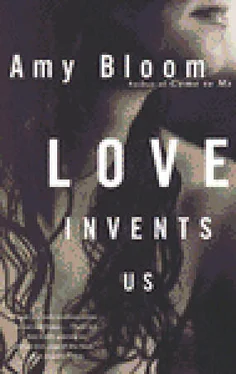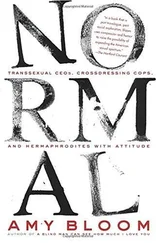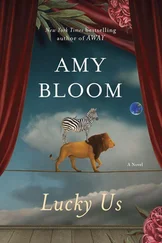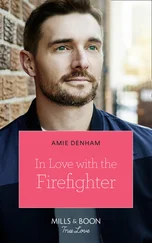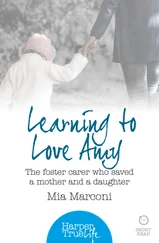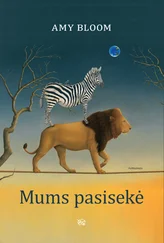Peter had waited almost a year before asking Elizabeth out the first time. He asked again, after another year, in such a careful, casually delicate way that Elizabeth only said “No, thank you,” fearing that any further remarks would show that she understood exactly what it had cost him to ask. For the past few months they’d eaten lunch together, standing up in the stockroom, putting their coffees near books they preferred not to sell, and avoiding all personal remarks (Peter lost most of his hair, suddenly, without the adjustment period of a receding hairline or widening bald spot; Elizabeth’s clothes, clean but unironed, were alternately too big or too small; she didn’t seem to know what size she was). They never made the kind of affectionate, scolding remarks that other people made to them all the time. All they offered was respect for each other’s stunning haplessness. Out of consideration, they continued to act as if the other person had not destroyed the friendship.
“It’s me,” said Rachel.
“Are you all right?” Elizabeth would have driven all night for Rachel, offered her a kidney, shot her captors and coached her through labor, but she’d only called twice since Rachel came back from Kenya three years ago; Rachel didn’t have time for a bad friend, and Elizabeth couldn’t do any better.
“I’m fine.” Rachel was always fine. “I thought you’d want to know Max is in the hospital. My hospital. Triple bypass. In his condition, that’s not so good. Cabbage.”
Rachel was in pediatric oncology now. She knew what was good and not so good, medically speaking.
“Oh my God. He’s a cabbage?”
“No, listen to me. Coronary artery bypass graft surgery. That’s just what they call it. What’s new with you?”
Rachel’s private name for Elizabeth, the name she uttered only in her head, was Slug. And when Rachel’s heart was being trampled by the steel-capped boots of her latest snake-hipped, mean-hearted girlfriend, she thought it might not be so bad to be Slug, not terrific to be a burnout at twenty-four, but not so bad to be comfortably buried in a life of books and platonic affection.
“But he’s okay? Is Greta with him? Who told you?”
“Sam Lieb had him in ninth grade, too. He saw his name on the patient list, sweetie. So I checked. Listen, I gotta go. He’s not good but he’s not dead. I heard they split up.” There were loudspeaker voices in the background. “Have to go now. Bye, sweetie.”
Elizabeth left Spivey’s and drove the four hours to Great Neck. She had an extra-large, sturdy paper cup of coffee, two Heath bars, and forty bucks, which blocked the onset of really bad feelings. She parked behind what used to be Squire’s Movie Theater, looking for Bee’s Corseterie, and saw it was now a North Shore version of the Empress Josephine’s silk-paneled dressing rooms. The new owners, who would not have hired the original Bee, served tea in china cups and concealed their cash register behind a large folding screen laminated with scenes from the Rape of the Sabine Women . Elizabeth crept along the edges of the store, avoiding the four lion-maned salesgirls manning their stations in sheer silk blouses and long slit suede skirts, bits of fancy bra and flower-trimmed garter aggressively displayed above and below.
Did women really wear this stuff? Maybe he would have loved it, Elizabeth thought, fingering the chiffon-and-satin tap pants. I could have given him six years of leopard-skin bustiers and push-up bras and black silk stockings held up with black satin rosettes. I could have pleased him, I wasn’t busy. And if I had, I could just let him die now, I wouldn’t even have to send flowers.
The salesgirls were not unused to gloomy young women picking up silky items in despair, putting them aside, and picking them up again, eyeing red satin panties and hand-embroidered nightgowns with reluctant, embarrassed hope. Even the stupidest salesgirl knew that underwear, even underwear dotted with seed pearls and edged with slender pink ribbons through the inch-wide lace trim, didn’t really make a difference. Still, they watched Elizabeth, and the youngest, newest salesgirl was determined to sell her something. She showed Elizabeth things young women wear to please young men, virginal gowns in transparent white cotton, strips of pink satin cut for small breasts and long, hard thighs.
“No,” she said. “It’s not what I’m looking for. My boyfriend’s not this type.” Elizabeth smiled, thinking of what type Max had been, and the salesgirl decided she’d been mistaken, that this was not another girl in love with the wrong guy.
“Okay, what type is he?”
“Conservative. Like a father.” Like a father, if you wanted a life on talk shows.
“Your boyfriend is like my dad?” The salesgirl took a step back, clutching at the edge of a bleached pine cabinet filled with soft pastel undershirts, apparently taken off the backs of rich little girls.
“Sorry, I don’t even know your father,” Elizabeth said, very sorry that she was wasting Max’s last hours on this blonde moron. “I just know — I just know this guy. Something outrageous, okay? Let’s find something completely outrageous. Something to bring the dead back to life.” The salesgirl was not happy, but she worked on commission. She helped Elizabeth find everything she wanted.
Elizabeth buttoned up her old raincoat in the hospital parking lot and went through reception. She passed two Candy Stripe girls, dark as cherrywood, with organza bows clustered high and bright atop their small sleek heads, like tribal headdresses from Woolworth’s. The nurse at the station stepped in front of her, but Elizabeth said she was Max’s niece and kept going. Pat O’Donnell was the daughter of Elizabeth’s eighth-grade English teacher; she had her father’s pre-ulcerous stomach and twenty years of nursing, and she knew that wasn’t a niece, not with those heartsick eyes, but she didn’t care. Might be interesting when the wife showed up.
Max lay in bed, his head propped up by two slippery hospital pillows, his hair a greasy spray of grey spikes. They had taken the tubes out of his nose but left two still winding down into his chest and another one connecting his left arm to a bulging, transparent drip bag. He looked like the Tin Woodsman, poorly patched and strapped together, wandering the cold world over for a heart. Elizabeth’s own heart beat between her ears, blood pooling in her veins.
“You’re here,” Max whispered.
Tears floated on the inside-out red edges of his eyes, and the visit Elizabeth had imagined dissolved. She would not do a quick and funny strip for him, dropping one shoulder of her trenchcoat to reveal her black lace bra. The sight of her white skin and tight black garters would not raise him off the bed. Scented talc gleaming between her breasts and thighs would not steady his breathing. He was going to die because she had been selfish and stupid and childish. He was going to die because she hadn’t answered his letters. I have to go right now, she thought.
Max’s hands lay folded on his chest. “Je ne regrette, je ne regrette, non, je ne regrette rien ,” he sang out hoarsely in cartoon French.
“Peter, this is Elizabeth. I need some sick leave or vacation, whatever. Time off.”
“All right. Why?”
“My father’s very sick. I think he’s dying.”
“Jesus. Your father? I’m sorry. Are you going to stay with him until … I mean, for a few weeks?”
“I don’t know. I have to take care of him. I have to nurse him.”
“Of course. You know, my mother died of cancer five years ago. Do what you have to do. I can hold the job for at least three months.”
“Fine. Okay. I’ll call you soon. Thanks.” I should have gone out with you. I should be buying animal-shaped mugs and a butcher-block kitchen table, and I should be going in some other direction. I am not old enough for rubber sheets and bedsores and that smell which is as recognizable as reveille.
Читать дальше
